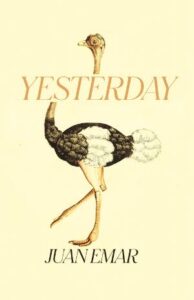In the city of San Agustín de Tango, the banal is hard to tell from the bizarre. In a single day, a man is guillotined for preaching the intellectual pleasures of sex; an ostrich in a zoo, reversing roles, devours a lion; and a man, while urinating, goes bungee jumping through time itself—and manages to escape. Or does he? Witness the weird machinery of Yesterday, where the Chilean master Juan Emar deploys irony, digression, and giddy repetitions to ratchet up narrative tension again and again and again, in this thrilling whirlwind of the ecstatically unexpected—all wed to the happiest marriage of any novel, ever.
Born in Chile at the tail end of the nineteenth century, Juan Emar was largely overlooked during his lifetime, and lived in self-imposed exile from the literary circles of his day. A cult of Emarians, however, always persisted, and after several rediscoveries in the Spanish-speaking world, he is finally getting his international due with the English-language debut of Yesterday, deftly translated by Megan McDowell. Emar’s work offers unique and delirious pleasures, and will be an epiphany to anglophone readers.

Yesterday will be available from New Directions on April 5, 2022.
We went out onto the street under a damp, gray sky. We had planned to visit the San Andrés Zoo, so off we went in that direction.
In itself, to tell the truth, I didn’t find the zoo much deserving of its fame—very few of the creatures there were worthy of attention. Let’s see: the fourteen lionesses were so-so, the monkeys a bit more so, and very much so, I can’t deny it, was the ostrich. But, beyond these, the rest left me cold.
The lionesses were interesting primarily because of the role one of them would soon come to play, but also because of the utter uniformity of their movements, as if they were propelled by a single spring hidden from our eyes. And as I imagined the possibility of this spring, I also had to imagine someone beside it, activating the movements that would then manifest in the she-lions themselves.
Thinking thus, the following phrase came to me spontaneously and stuck fast: “Fourteen she-lions secretly moved by a secret spring the he-lion moves.”
I brought my lips to my wife’s left ear and whispered this phrase. She looked at me sidelong and whispered: “Litterateur.” Whatever the case, their uniformity rose to a level of majesty.
As we drew closer to the trench that encircled the vast space re- served for them, the fourteen she-lions slept—on the ground or on rocks or teetering in the trees—they slept, I say, in the exact same pose. After a minute they all flicked their tails once, no more. After another minute they stretched, yawning and showing their claws, after which they got up and shook themselves the way dogs do when they leave the water. Then, suddenly, they all turned their heads our way and stared at us with utter, petrifying fixity. And then a very strange thing happened. Up until that moment the zoo had been full of the various sounds of other caged animals, and the birds, the wind in the trees, and even the city nearby. Of human noises there were none, as my wife and I were the only people there. And, well, when the lionesses looked at us, all sound ceased, down to the tiniest whisper, a black, absolute silence fell over us, and we were paralyzed. In that silence, the twenty-eight rays from those eyes pierced our bodies so cleanly and easily that both of us felt, from our heads to our feet, fourteen sharp, strident little pains as the eye rays bored right through us and drove into the earth some distance behind us. This began to be intolerable.
“Let’s go, let’s go!” I said to my wife. “If we carry on like this, bits of lion gaze will be left circulating in our blood, and we cannot let that happen, since we still have, my darling, many things left to do in this life.”
“Very true,” she replied. “Let’s go!”
We fled, disturbed and almost frightened. Only when we reached the trench that separated us from the monkeys did we regain our calm. A high rock had been set up in the center of their enclosure, a very high and steep rock indeed, on which the monkeys climbed, ran around, jumped, and climbed some more. There were hundreds of monkeys, all belonging to the cynocephalus family, though they seemed smaller than animals of that genus I had seen before. They looked happy to be right where they were. Some of them, between one leap and another, hungrily gobbled handfuls of peanuts; others had brief scuffles; some couples mated. In short, the usual life led by such creatures. I remember one who sat down facing us, dignified, then turned its big, doglike head in profile and urinated profusely.
The day was still gray and dark. We were about to continue our walk when a beam of sunlight broke through the clouds and bathed the entire rock in its glow. What a magnificent, splendid sight we beheld then! The hundreds of monkeys paused, amazed, and looked up at the sun and opened their mouths disproportionately wide, and then they burst out in a glorious song.
It started with a single note, just one, and then the song climbed upward, rocking softly like a roller coaster, and when it reached its highest point it turned sharp, shrill, and savage. At that point, the monkeys stood on their hind legs and raised their arms to the sun. Then the song started its descent, and once it reached its lowest point, the sound it produced became cavernous, like the tumbling of subterranean rocks. The monkeys then bent to stand on four legs, which shook like springs and made their bodies tremble fast. From there the ascent started again, long, long, and the creatures began to stand erect, and it seemed to us that we were held aloft in the air by invisible, hairy hands. And then after a moment, at the song’s most piercing point, downward, downward! Once more, the long way down. The sun shone. Now up again. Now down.
My wife elbowed me and, indicating the monkeys with her eyes, she motioned to me that I should do as they, and she, did. My wife sang. A round and blue contralto, a windpipe of soft vel- vet—that is my wife’s voice. Parallel, exactly parallel to the roller coaster of the cynocephali’s voices, only a third lower, she added her sweet, husky voice. And roller coaster and windpipe then set out together to spiral through the air, cavorting with the beam of sunlight in magnificent harmony. I was held captive by the thou- sand cynocephali and the interminable note of my wife’s voice beneath theirs. But a second dig from her elbow called me to my duty. I took a deep breath, filling my lungs with fresh air, yes, very fresh, except that, with a certain wisdom, I chose to mix in a bit of monkey scent and a hint of my life companion’s perfume. That way, I was all tangled up in that splendid sound and, after clearing my throat, I managed to emit a sound a fifth higher than the mon- keys’ song with my limpid tenor voice. And we all rocked through the air on our vibrations: the monkeys holding on to each other on their roller coaster; I, higher up with my flat, silvery voice; below, cementing everything together, my wife and the blue velvet of her serene windpipe.
We went down. For me, so much better than going up. But soon a fear for my wife began to fill me. Oh, vain fear! Oh, blessed woman of mine! May my admiration for you be forever stamped upon these pages! As the thousand creatures set off a formidable avalanche of subterranean rocks, as I myself descended hundreds of meters below the earth’s surface, my wife, defying and demol- ishing all, went down with incredible agility, respecting the same agreement she had made in the middle of the journey when she began to sing, so that, to the monkeys’ inferno, to my own clay substrate, she added the majestic sliding of deep waters that have never seen the sun’s light and are emptied into the earth’s entrails through caverns that none of us will ever see, save for when she revealed them to us through her song.
Another ascent began. Soon we reached the surface of the earth. We went up. Now I was flooded with fear for myself. It was easy for the monkeys to reach the highest, shrillest of notes, but I don’t believe there is a human voice in the world that could equal such heights. And especially not my own! I began to tremble like a child. I was defenseless. I was going first, at the apex, crowned by the sun, my skin pricked by sharp knives of cold air in our prodigious ascent. And I felt at my back the keen whistle from the thousand throats of the cynocephali driving me pitilessly onward. And behind, far behind, in desperation, I heard the murmur of my companion’s low voice, far, far away from me. But yet again, as so often in my life, my wife came generously to my aid. My voice was at its highest point. The others, as they pushed, were starting to needle me as I reflexively resisted. Then my wife indicated to me where her own note was, then the monkeys’, then finally—and here was my salvation—the space that was left between the two. A quick wink from her begged me to throw myself from my heights without hesitation and into that harmony-preserving space. But how? Would there be a place for me? Or, in trying to find it, would I destroy the song, causing it to erupt into the most gnashing dissonance?
No. It was only a question of sharpening and tuning my ears in a different way, and the three voices would span half the original distance between the highest and lowest notes—my wife always below, me now huddled in the middle and the monkeys at the apex. And our three voices would continue in a different harmony, a different existence, climbing up towards the sun.
All it took was the decision. I threw my flat, silver voice down- ward; I collided with the thousand sharp points of air ascending; there was a brief snapping sound like metal hitting the ocean; and I continued falling, nearly reaching my beloved’s velvet pipes. But quickly she helped me find—aided also by my newly tuned ears— just the right position for my voice, and, fearless now, comforted with her behind me, the monkeys in front, protecting me from the cold knives of air, we went on in a harmony never before heard, we went on, spellbound, absorbed, reaching the furthest point be- yond which there is no music, no discrete sound—no individual sounds, you might say, as ours were—where everything, all existence, was one single and absolute music.
A cloud passed. The sun disappeared. Our voices plunged like injured birds from those fantastic heights and disappeared, dead, back down our throats. We fell mute in the new gray.
Many monkeys urinated. Some hit each other. One couple mated. Others gobbled handfuls of peanuts.
“Let’s go!” I said to my wife. “Let’s go! Enough already of cynocephali!”
“Yes, enough,” she said. “Let’s go.”



